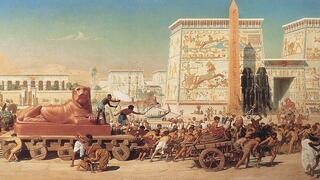Searched: bible
News
Christians today aren't the first to wonder about the parts of Jesus' life the Bible doesn't comment on.
|
Some skeptics claim the apoycryphal books were arbitrarily left out of our Protestant Bibles. But is that true?
|
Speaker Mike Johnson and House Republicans joined Democrats to pass a sweeping hate crime bill that will outlaw passages of […]
|
Every sin requires Christ's atonement. But the Bible shows God punishing—and repairing—different sins differently.
 Christian theology consistently holds together truths that seem to want to fall apart: Jesus is fully God and fully human. People are sinners and created in the image of God. The church is local and universal.And yet, despite what we affirm, in practice, Christians are often unable to walk and chew gum at the same time. Instead of holding two truths in tension, we tend to slide to one side or the other, distorting it in the process. We treat Jesus either as an invulnerable, transcendent being or as a mere prophet. We speak as if humans are either so degraded we are capable of nothing but sin or mostly fine with a few rough edges. We think of the church as if it were only our own sect or we minimize the local congregation.Evangelical theologians have done great work in Christology, anthropology, and ecclesiology, respectively, to retrieve those three truthful tensions. But there is a fourth tension yet to be retrieved: All sins ruin us, and yet not all sins ruin us equally.To start, let us be clear: Sin—however small—is a serious thing. And sin is only atoned for by the work of God in Jesus Christ. But saying that Christ is the only one who atones for all sin is different from saying that all sins do the same kind of work on us.All sins break the sinner and create havoc around us. And yet the Scriptures consistently depict the sins we do as different, not only in effect on one another but before God. Within the Law, for example, different social remedies are given for different sins, and so are different sacrifices (Lev. 4; Ex. 21). Not everything requires a bull or a goat. Sometimes a dove will do. In the Prophets and Proverbs, God distinguishes—and even prioritizes—certain ...Continue reading... Christian theology consistently holds together truths that seem to want to fall apart: Jesus is fully God and fully human. People are sinners and created in the image of God. The church is local and universal.And yet, despite what we affirm, in practice, Christians are often unable to walk and chew gum at the same time. Instead of holding two truths in tension, we tend to slide to one side or the other, distorting it in the process. We treat Jesus either as an invulnerable, transcendent being or as a mere prophet. We speak as if humans are either so degraded we are capable of nothing but sin or mostly fine with a few rough edges. We think of the church as if it were only our own sect or we minimize the local congregation.Evangelical theologians have done great work in Christology, anthropology, and ecclesiology, respectively, to retrieve those three truthful tensions. But there is a fourth tension yet to be retrieved: All sins ruin us, and yet not all sins ruin us equally.To start, let us be clear: Sin—however small—is a serious thing. And sin is only atoned for by the work of God in Jesus Christ. But saying that Christ is the only one who atones for all sin is different from saying that all sins do the same kind of work on us.All sins break the sinner and create havoc around us. And yet the Scriptures consistently depict the sins we do as different, not only in effect on one another but before God. Within the Law, for example, different social remedies are given for different sins, and so are different sacrifices (Lev. 4; Ex. 21). Not everything requires a bull or a goat. Sometimes a dove will do. In the Prophets and Proverbs, God distinguishes—and even prioritizes—certain ...Continue reading... |
Some skeptics claim the apoycryphal books were arbitrarily left out of our Protestant Bibles. But is that true?
|
The Bible-based series entered Disney Plus? in recent days, giving the award-winning TV show another major outlet and placing it in front of the company's 112 million subscribers. The first three seasons of the four-season series are on Disney Plus.?
|
 Society is seeing an attack on the family and biblical worldview, as demonstrated by the rise in deconstruction and biblical illiteracy — but there is a solution, according to Jack Graham. Society is seeing an attack on the family and biblical worldview, as demonstrated by the rise in deconstruction and biblical illiteracy — but there is a solution, according to Jack Graham. |
There's a biblical doctrine that's comes under attack a lot and that's the doctrine of the sufficiency of Scripture. In other words, “is Scripture enough?”
|
Christians can study creation for God's glory and our good. But science doesn't trump the Bible. God's Word is the ultimate authority because it's flawless.
|
Christians can study creation for God's glory and our good. But science doesn't trump the Bible. God's Word is the ultimate authority because it's flawless.
|
There's a biblical doctrine that's comes under attack a lot and that's the doctrine of the sufficiency of Scripture. In other words, “is Scripture enough?”
|
In our video Bible Classes we have concluded our journey through the Epistles of Peter. Now we begin a new adventure! Nehemiah has 13 chapters (a total of 406 verses) waiting to be explored! Come study with us … — Dr. Mike Bagwell .
|
The pastor of a North Carolina mega-church denounced the “God Bless the USA Bible” as blasphemous and disgusting. Watch the […]
|
? Temple Baptist Church - 4-28-2024Psalm 119:129-136? Introduction:? A. Psalm 119 contains 176 verses broken down into 22 stanzas with each stanza corresponding with a letter of the Hebrew Alphabet and each stanza containing 8 verses with each verse in the Hebrew beginning with the identified letter. In Psalm 119, we find the ultimate magnification of the Word of God. It is the belief in the Word of God that both identifies and separates the Biblicist from all else.? B. PE -? פ– the 17th? letter of the Hebrew Alphabet. PE means “mouth” or by extension “speech” “breath” “vocalization” Its numerical value is 80 which carries the meaning of strength or maturity. “Three score and ten or fourscore by reason of strength. Moses was 80 years old when he led Israel out of Egypt.? C. When speaking of the Word of God, we often use the expression “God Breathed.”? 1. God breathing out is Expiration. Inspiration is to infuse or to breathe in. When you die, you breathe out for the last time and expire. When you place someone on a ventilator or give mouth-to-mouth resuscitation, the patient breathes in which is Inspiration.? 2. The best definition of Inspiration is found in Genesis, chapter 2.? Genesis 2:7 And the LORD God formed man of the dust of the ground and breathed into his nostrils the breath of life and Adam became a living soul.? 3. God breathed into Adamis nostrils the breath of life. God infused eternal life into Adam and he became a living soul.? 4. All Scripture is given by Inspiration of God or is infused by God. God breathed into men the Word of God. These men breathed out the Word of God under the power and control of the Holy Ghost. The Word of God was infused or Inspired when properly recorded.? 2 Peter 1:21 For the prophecy came not in old time by the will of man: but holy men of God spake as they were moved by the Holy Ghost.? 5. Many of the original manuscripts were a preservation of what the inspired speaker said.? This scribe was known as an “amanuensis”? A·man·u·en·sis (scribe, writer, copyist).? D. The First Mention of Said is found in Genesis, chapter 1.? Genesis 1:3 And God said, Let there be light: and there was light.? E. The First Mention of Breath is found in Genesis, chapter 2. Genesis 2:7 And the LORD God formed man of the dust of the ground, and breathed into his nostrils the breath of life; and man became a living soul.? F. The First Mention of Voice is found Genesis, chapter 3.? Genesis 3:8-10 And they heard the voice of the LORD God walking in the garden in the cool of the day: and Adam and his wife hid themselves from the presence of the LORD God amongst the trees of the garden. (9) And the LORD God called unto Adam, and said unto him, Where art thou? (10) And he said, I heard thy voice in the garden, and I was afraid, because I was naked; and I hid myself.? 1. God spoke to men. An audible Voice.? 2. God spoke through men. An Inspired Voice.? 3. In both instances, the Word of God came from God, not man!? G. This 17th? Stanza begins with Wonder and ends with Weeping. You either love the Word of God and finding its wonder in the Volume of the Book or you reject the Word of God and find that weeping will be the result of such denial. You love the Bible, or you do not love the Bible. There can be no middle ground.? 1. Verse 129. God's Word inspires Wonder in the loving reader. Wonder of God's Word inspires Obedience to it. The Testimonies of the Word of God show both the Mind of God and the Will of God.? 2. Verse 130. God's Word giveth Light. The Light of God's Word gives Understanding. Obedience leads to Understanding. Once again, we revisit Psalm 119:105. “Thy word? is? a lamp unto my feet, and a light unto my path.” Our understanding of the Word of God defines the what, how, and when of God. We understand what is going on in our day through the Light of the Scriptures. What God is doing, how God is doing it, and when God will do it.? 3. Verse 131. God's Word brings Desire and Thirsting. To pant after is to seek something with all your heart. Understanding leads to Desire. The Desire for the Word of God brings forth a desire for God!? Psalms 42:1 To the chief Musician, Maschil, for the sons of Korah. As the hart panteth after the water brooks, so panteth my soul after thee, O God.? Psalms 63:1-2 A Psalm of David, when he was in the wilderness of Judah. O God, thou art my God; early will I seek thee: my soul thirsteth for thee, my flesh longeth for thee in a dry and thirsty land, where no water is; (2) To see thy power and thy glory, so as I have seen thee in the sanctuary.? 4. Verse 132. The Word of God introduces us to Goodness and Mercy. God is both Good and Merciful throughout the history of His people. Desire leads to Love. Desire leads to I have heard it said, “I want to get what I deserve.” My cry is the opposite: “I'm glad that I will not get what I deserve!” The word “mercy” in one form or another is found 277 times in the Bible, God's Breathed Word. God gave David that promise when He breathed out the 23rd? Psalm, a story of David's life in Christ Jesus from salvation until eternity.? Psalms 23:6 Surely goodness and mercy shall follow me all the days of my life: and I will dwell in the house of the LORD for ever.? 5. Verse 133. The Word of God Orders our Steps. Love leads to Guidance. God's footsteps are hidden but through the Word of God, they are ordered. God has both ordered and secured the steps of the righteous and clarified in the Word of God.? Psalms 77:19 Thy way is in the sea, and thy path in the great waters, and thy footsteps are not known.? Psalms 37:23 The steps of a good man are ordered by the LORD: and he delighteth in his way.? 6. Verse 134. The Word of God brings us Deliverance. Guidance by the Breathed Word of God leads to Deliverance. Here we find deliverance from the enslavement of sin, the deception of Satan, and the oppression from sinners. Though battles had to be fought, Israel's victory had been assured through the Word of God.? Psalms 56:1-3 Be merciful unto me, O God: for man would swallow me up; he fighting daily oppresseth me. (2) Mine enemies would daily swallow me up: for they be many that fight against me, O thou most High. (3) What time I am afraid, I will trust in thee.? 7. Verse 135. The Word of God gives us Freedom. In Deliverance, we find Freedom. The Truth is the only thing that will make the child of God free. When King David repented of his sinfulness, God delivered him and answered his request. “Restore unto me the joy of thy salvation!”? John 8:31-32 Then said Jesus to those Jews which believed on him, If ye continue in my word, then are ye my disciples indeed; (32) And ye shall know the truth, and the truth shall make you free.? Psalms 51:12 Restore unto me the joy of thy salvation; and uphold me with thy free spirit.? 8. Verse 136. The Breathed Word of God causes Weeping. In Freedom, we find Weeping. Oh, that this world would turn their eyes upon Jesus! The spoken Word became the Inscribed Word, and the Inscribed Word became the Incarnate Word! The Word of God is “God Breathed!”
|
Temple Baptist Church - 4-28-2024Romans 10:1-17? Introduction:? A.? Verse 3 says, “They being ignorant.”? Ignorant?? Lacking knowledge or? comprehension? of the thing specified.? The implication of the word “being” is to ignore.? In the Bible, we find two kinds of ignorance:? 1.? Ignorance as a result of not hearing or being taught.? Amos 8:11-12? Behold, the days come, saith the Lord GOD, that I will send a famine in the land, not a famine of bread, nor a thirst for water, but of hearing the words of the LORD:? (12)? And they shall wander from sea to sea, and from the north even to the east, they shall run to and fro to seek the word of the LORD, and shall not find it.? 2.? Willful ignorance as a result of rejecting what is heard or taught.? Hosea 4:6? My people are destroyed for lack of knowledge: because thou hast rejected knowledge, I will also reject thee, that thou shalt be no priest to me: seeing thou hast forgotten the law of thy God, I will also forget thy children.? 3.? As your pastor, it is my responsibility that, if you remain ignorant, it will have to be willful ignorance!? 4.? Israel was Ignorant, but their ignorance was willful!? Look at the preceding verses found in chapter 9:32-33.? “As it is written!”? THEY HAD THE WORD OF GOD!? THEY KNEW THE WORD OF GOD!? THEY DISREGUARDED THE WORD OF GOD!? ? 5.? SO IT IS IN OUR DAY AS WE HAVE THE WORD OF GOD!? The problem today is the same as the problem then.? ? Hosea 4:6? My people are destroyed for lack of knowledge:? because thou hast rejected knowledge, I will also reject thee!? B.? One of the age-old problems (and one that remains in our day) is that people are ignorant of what it takes to get to heaven.? Most religions along with so-called Christian denominations add works to faith in one degree or another.? C.? Self-righteousness in Salvation.? Salvation through personal merit or a mixture of personal merit and faith.? The Bible is perfectly clear about the separation of faith and works.? Romans 11:5-6? Even so then at this present time also there is a remnant according to the election of grace.? (6)? And if by grace, then is it no more of works: otherwise grace is no more grace. But if it be of works, then is it no more grace: otherwise work is no more work.? Ephesians 2:8-9? For by grace are ye saved through faith; and that not of yourselves: it is the gift of God:? (9)? Not of works, lest any man should boast.? Acts 4:11-12? This is the stone which was set at nought of you builders, which is become the head of the corner.? (12)? Neither is there salvation in any other: for there is none other name under heaven given among men, whereby we must be saved.? ? 1.? Self-righteousness manifests itself in those who believe that they are good enough to go to heaven through personal merit.? 2.? Self-righteousness manifests itself in those who believe that they are good enough to maintain their salvation through personal merit.? ? 3.? Both doctrines are heretical!? D.? In our text, we find why Israel turned from their Messiah, Christ Jesus.? Israel, who had the truth of God's Word and the Covenants, turned from the faith of their father, Abraham, to the wickedness of self-righteousness.? ? 1.? In the 400 hundred silent years that preceded the coming of Christ (around 100 B.C.) between Malachi and Matthew, two main branches of Judaism came into dominance: 1)? The Sadducees who upheld the Written Law? 2)? The Pharisees who upheld the Oral Law.? ? 2.? ? Galatians 6:12-14? As many as desire to make a fair shew in the flesh, they constrain you to be circumcised; only lest they should suffer persecution for the cross of Christ. ? (13)? For neither they themselves who are circumcised keep the law; but desire to have you circumcised, that they may glory in your flesh. ? (14)? But God forbid that I should glory, save in the cross of our Lord Jesus Christ, by whom the world is crucified unto me, and I unto the world.? ? 3.? They had the unbiblical perspective that they had “arrived” spiritually through their outward appearance and separation from the world.? This attitude resulted in exclusion!? E.? The Pharisees were separatists and, unfortunately, they eventually began to rely upon their system of “do's and don'ts” for righteousness with God instead of becoming obedient to God's righteousness.? The Lord rebuked them for making clean the outer appearance while the inner man was full of dead men's bones and rottenness.? ? In Matthew 5:20, our Lord said, “Except your righteousness shall exceed the righteousness of the scribes and Pharisees, ye shall in no case enter into the kingdom of heaven.”? F.? The problem still exists today.? Separatism and Phariseeism are not the same.? God command us to be separate but, if not watchful, the same problem arises again.? I once saw on a sign this quote, “People are like fish: you catch them but let God clean them.”? ? G.? Paul's desire and prayer for Israel was that they would recognize who Jesus Christ was and turn to Him for salvation.? Israel had “zeal” for God but not according to knowledge.? Spirit is good but leaves one lost without truth.? I want to look at a few things in this text.? 1.? Ignorance of God's Righteousness.? Vs. 3.? “not according to knowledge…ignorant of God's righteousness”? ? Psalms 71:19? Thy righteousness also, O God, is very high, who hast done great things: O God, who is like unto thee!? a.? Ignorance is not necessarily a bad word as it means that one has not learned.? In Romans 10, I believe that the ignorance mentioned was willful.? ? b.? Israel was familiar with the Old Testament and especially the Pentateuch.? One of the greatest of Old Testament truths found in these first 5 books was that of the holiness of God.? Mt. Sinai should have left a lasting impression upon the nation of Israel as God thundered from a mountain that was on fire.? ? ? c.? Israel's ignorance was willful!? The world's ignorance is willful!? The world of today tries to bring God down to man's level and man up to God's level.? 2.? Impeccability of God's Righteousness.? Vs. 3.? “God's righteousness”? The Bible declares that God dwells in a light that no man can approach unto.? He is impeccably holy.? He is immutably holy.? He said, “I am the Lord, I change not.”? 1 Timothy 6:15-16? Which in his times he shall shew, who is the blessed and only Potentate, the King of kings, and Lord of lords;? (16)? Who only hath immortality, dwelling in the light which no man can approach unto; whom no man hath seen, nor can see: to whom be honour and power everlasting. Amen.? a.? Salvation must always be by grace through faith because God demands absolute perfect holiness, and He alone is impeccably holy.? b.? Acceptance of God's righteousness is the rejection of personal righteousness.? 3. Impossibility of God's Righteousness.? Vs. 3.? “going about to establish their own righteousness.”? ? Ecclsiastes 7:20? For there is not a just man upon earth, that doeth good, and sinneth not.1 John 1:8-10? If we say that we have no sin, we deceive ourselves, and the truth is not in us.? (9)? If we confess our sins, he is faithful and just to forgive us our sins, and to cleanse us from all unrighteousness.? (10)? If we say that we have not sinned, we make him a liar, and his word is not in us.? a.? One fact that every saved person understands is that of personal sinfulness.? There are those who believe that they are sinless, but they are deceived and lost.? ? b.? No conviction of sinfulness means there is no Holy Spirit there to convict.? Men everywhere are trying to be right with God with what they do instead of what He did.? 4.? Insubordination to God's Righteousness.? Vs. 3.? “have not submitted themselves”? ? Galatians 3:1-3? O foolish Galatians, who hath bewitched you, that ye should not obey the truth, before whose eyes Jesus Christ hath been evidently set forth, crucified among you?? (2)? This only would I learn of you, Received ye the Spirit by the works of the law, or by the hearing of faith?? (3)? Are ye so foolish? having begun in the Spirit, are ye now made perfect by the flesh?? ? a.? Along with recognition of God's righteousness, one must become obedient to the holiness of God's demand: obedience to the gospel.? Vs. 16.? ? b.? Romans 1 shows the progression of the knowledge of God rejected:? 1)? When they knew God, they glorified Him not as God - God gave them up)? 2)? They changed the truth of God into a lie - God gave them up again? 3)? They did not like to retain God in their minds - God gave them over to a reprobate mind.? 5.? Imputation of God's Righteousness.? Vs. 4.? “For Christ is the end of the law for righteousness to every one that believeth.”? Salvation is a result of God's righteousness being imputed to the believer through propitiation and faith.? ? 2 Corinthians 5:21? For he hath made him to be sin for us, who knew no sin; that we might be made the righteousness of God in him.? Jude 24-25? Now unto him that is able to keep you from falling, and to present you faultless before the presence of his glory with exceeding joy,? (25)? To the only wise God our Saviour, be glory and majesty, dominion and power, both now and ever. Amen.? ? “Dressed in His righteousness alone; faultless to stand before the throne.”? “When He sees me, He sees the blood of the Lamb; He sees me as worthy and not as I AM!”? 6.? Invitation of God's Righteousness.? Vs. 13.? “For whosoever shall call upon the name of the Lord shall be saved.”? ? ? ? “Whosoever” covers it all!? Come to Jesus Christ with your bankrupt life and He will impute His righteousness to you.
|
A late historian explores how crusade hymns told both the classic story of gospel salvation and the evolving story of evangelical worship music.
 Crowds of over 50,000. Famous special guests. Hundreds of cities in the US and around the world. Beloved, catchy songs. For many, these might sound like readouts from the Taylor Swift Eras Tour hype machine. But exchange the glittery girl power for the gospel in baritone, and you have one of the most successful musical touring acts in the postwar world: the Billy Graham Crusades.The first association that “Billy Graham Crusade” may evoke is not musical at all, but rather a close-up shot of the evangelist, with his penetrating, wide-eyed gaze and raised forearms, thundering, “The Bible says …” Admittedly, music was not the main focus.Yet as the late historian Edith Blumhofer shows in her final book, Songs I Love to Sing: The Billy Graham Crusades and the Shaping of Modern Worship, neither Graham’s ministry nor the late-century rise of contemporary Christian music can be understood without it. As crusade song leader Cliff Barrows pursued his main goal—“sing to save”—he and his teammates bridged stylistic, cultural, and generational divides, transforming evangelicals’ music into the harmonic blend of old and new that is familiar today.Mining rich resourcesBefore unpacking this highly original book, a few words about the author. Blumhofer is an American religious historian renowned for her empathetic biographies of hymnist Fanny J. Crosby and evangelist Aimee Semple McPherson, as well as broader studies of evangelicalism and Pentecostalism. She concluded her career with this new study, sadly succumbing to a battle with cancer in the process.To finish the project, she tapped Jesus People expert Larry Eskridge, with whom she had for many years directed the Institute ...Continue reading... Crowds of over 50,000. Famous special guests. Hundreds of cities in the US and around the world. Beloved, catchy songs. For many, these might sound like readouts from the Taylor Swift Eras Tour hype machine. But exchange the glittery girl power for the gospel in baritone, and you have one of the most successful musical touring acts in the postwar world: the Billy Graham Crusades.The first association that “Billy Graham Crusade” may evoke is not musical at all, but rather a close-up shot of the evangelist, with his penetrating, wide-eyed gaze and raised forearms, thundering, “The Bible says …” Admittedly, music was not the main focus.Yet as the late historian Edith Blumhofer shows in her final book, Songs I Love to Sing: The Billy Graham Crusades and the Shaping of Modern Worship, neither Graham’s ministry nor the late-century rise of contemporary Christian music can be understood without it. As crusade song leader Cliff Barrows pursued his main goal—“sing to save”—he and his teammates bridged stylistic, cultural, and generational divides, transforming evangelicals’ music into the harmonic blend of old and new that is familiar today.Mining rich resourcesBefore unpacking this highly original book, a few words about the author. Blumhofer is an American religious historian renowned for her empathetic biographies of hymnist Fanny J. Crosby and evangelist Aimee Semple McPherson, as well as broader studies of evangelicalism and Pentecostalism. She concluded her career with this new study, sadly succumbing to a battle with cancer in the process.To finish the project, she tapped Jesus People expert Larry Eskridge, with whom she had for many years directed the Institute ...Continue reading... |
When you look at the Bible, creation is a theme that goes from Genesis to Revelation. It's really the story that God is doing.? ?
|
How groups like Hillsong learned to let go of the literal in favor of creative collaboration.
 The refrain “He is for you” doesn’t translate neatly into Spanish. In the English version of Elevation Worship’s song “The Blessing,” the phrase repeats and builds with each repetition. But in Spanish, the line is “Él te ama” or “He loves you.”“I’m glad the translators did that,” said musician and translator Sergio Villanueva, who pastors a Hispanic congregation at Wheaton Bible Church in Illinois. “To convey that idea in Spanish—‘He is for you’—you would have to use a lot more words. Spanish is a beautiful language, but we use more words and longer words.”The translation choice in “The Blessing” (“La Bendición”) reflects a growing interest among English-speaking worship artists in producing thoughtful, singable, and culturally informed translations of their music.Often, artists are intent on using translations that are as close to word-for-word as possible. But as influential songwriters and megachurches expand their reach, teams of translators are helping produce new versions of popular worship songs that are faithful to the originals without trying to replicate wording that isn’t as accessible or evocative in another language.“You have to honor the intention of the original songwriter, even if that means changing exactly what the words are saying,” said Villanueva, who has translated for Keith and Kristyn Getty, Sovereign Grace Music, and Kari Jobe.The international distribution and transl ation of English-language worship music has accelerated over the past four decades, but not consistently.In the 1980s and early ’90s, Integrity Music began releasing ...Continue reading... The refrain “He is for you” doesn’t translate neatly into Spanish. In the English version of Elevation Worship’s song “The Blessing,” the phrase repeats and builds with each repetition. But in Spanish, the line is “Él te ama” or “He loves you.”“I’m glad the translators did that,” said musician and translator Sergio Villanueva, who pastors a Hispanic congregation at Wheaton Bible Church in Illinois. “To convey that idea in Spanish—‘He is for you’—you would have to use a lot more words. Spanish is a beautiful language, but we use more words and longer words.”The translation choice in “The Blessing” (“La Bendición”) reflects a growing interest among English-speaking worship artists in producing thoughtful, singable, and culturally informed translations of their music.Often, artists are intent on using translations that are as close to word-for-word as possible. But as influential songwriters and megachurches expand their reach, teams of translators are helping produce new versions of popular worship songs that are faithful to the originals without trying to replicate wording that isn’t as accessible or evocative in another language.“You have to honor the intention of the original songwriter, even if that means changing exactly what the words are saying,” said Villanueva, who has translated for Keith and Kristyn Getty, Sovereign Grace Music, and Kari Jobe.The international distribution and transl ation of English-language worship music has accelerated over the past four decades, but not consistently.In the 1980s and early ’90s, Integrity Music began releasing ...Continue reading... |
 A Pentecostal pastor is urging his congregants not to embrace the “God Bless the USA Bible” that includes documents central to the founding of the United States, deriding it as “blasphemous.” A Pentecostal pastor is urging his congregants not to embrace the “God Bless the USA Bible” that includes documents central to the founding of the United States, deriding it as “blasphemous.” |
Let us not give up meeting together—even when we disagree.
 Recently, a woman at my church approached me with a question borne out of genuine curiosity. She asked, “You’re a female theologian. Why did you choose to come to our church when women aren’t allowed to preach here?”Since much of my work as a Bible scholar is public, it is no secret that I support women’s full participation in ministry, including in church leadership. So I wasn’t surprised that someone happened to notice my convictions did not match our church’s practice on this issue.It’s a good question, and one I’ve wrestled with regularly—since, at present, I don’t feel I’m able to serve our church in all the ways that God has called and equipped me. I so long for the body of Christ to embrace the gifts of all its members, not only here but around the world. But as CT’s April issue reminds us, the global church is far from united on what women can and can’t do in church.Still, I was glad my friend asked me about our family’s decision-making process, because it’s face-to-face conversations like this that prevent polarization. The role of women isn’t the only issue that divides us today. Approaches to racial reconciliation or diversity initiatives, our posture toward climate change, and politics—particularly when there’s another contentious presidential election in sight—are all areas that threaten to fracture our faith communities.According to The Great Dechurching, a recent book by Jim Davis, Michael Graham, and Ryan P. Burge, people are leaving the church in unprecedented numbers. Forty million Americans who used to attend church no longer do—that’s 16 percent ...Continue reading... Recently, a woman at my church approached me with a question borne out of genuine curiosity. She asked, “You’re a female theologian. Why did you choose to come to our church when women aren’t allowed to preach here?”Since much of my work as a Bible scholar is public, it is no secret that I support women’s full participation in ministry, including in church leadership. So I wasn’t surprised that someone happened to notice my convictions did not match our church’s practice on this issue.It’s a good question, and one I’ve wrestled with regularly—since, at present, I don’t feel I’m able to serve our church in all the ways that God has called and equipped me. I so long for the body of Christ to embrace the gifts of all its members, not only here but around the world. But as CT’s April issue reminds us, the global church is far from united on what women can and can’t do in church.Still, I was glad my friend asked me about our family’s decision-making process, because it’s face-to-face conversations like this that prevent polarization. The role of women isn’t the only issue that divides us today. Approaches to racial reconciliation or diversity initiatives, our posture toward climate change, and politics—particularly when there’s another contentious presidential election in sight—are all areas that threaten to fracture our faith communities.According to The Great Dechurching, a recent book by Jim Davis, Michael Graham, and Ryan P. Burge, people are leaving the church in unprecedented numbers. Forty million Americans who used to attend church no longer do—that’s 16 percent ...Continue reading... |
Loran Livingston, lead pastor of Central Church in Charlotte, North Carolina, delivered? a Sunday sermon to his congregation of about 6,000 people concerning the importance of studying Scripture rightly without outside interference from false doctrine.
|
 Moshe Saban-Cohen and Matild Cohen-Levi, who made Aliyah to Israel from Egypt, recall their memories of the Nile and the reasons they left their wealth behind to start over in the Promised Land Moshe Saban-Cohen and Matild Cohen-Levi, who made Aliyah to Israel from Egypt, recall their memories of the Nile and the reasons they left their wealth behind to start over in the Promised Land |
 Available ancient Egyptian sources don't mention events documented in the Haggadah, or even specific names like that of the star of the Passover story, Moses, says Israeli scholar. So what can we glean from the scarce historical record of ancient Israelites in the Nile Delta? Available ancient Egyptian sources don't mention events documented in the Haggadah, or even specific names like that of the star of the Passover story, Moses, says Israeli scholar. So what can we glean from the scarce historical record of ancient Israelites in the Nile Delta? |
 A bible used by former first lady Jacqueline Kennedy-Onassis after the November 1963 assassination of her husband, President John F. Kennedy, is up for auction.? A bible used by former first lady Jacqueline Kennedy-Onassis after the November 1963 assassination of her husband, President John F. Kennedy, is up for auction.? |
Preaching how God hates abortion has its place because He calls us to speak His truth in our generation, but it must be done in love and gentleness. God's most interested in drawing lost sinners to Himself through His Son Jesus Christ.
|



 Links
Links  Articles
Articles  Blogs
Blogs  Videos
Videos  News
News  Colors
Colors 

 New links
New links

